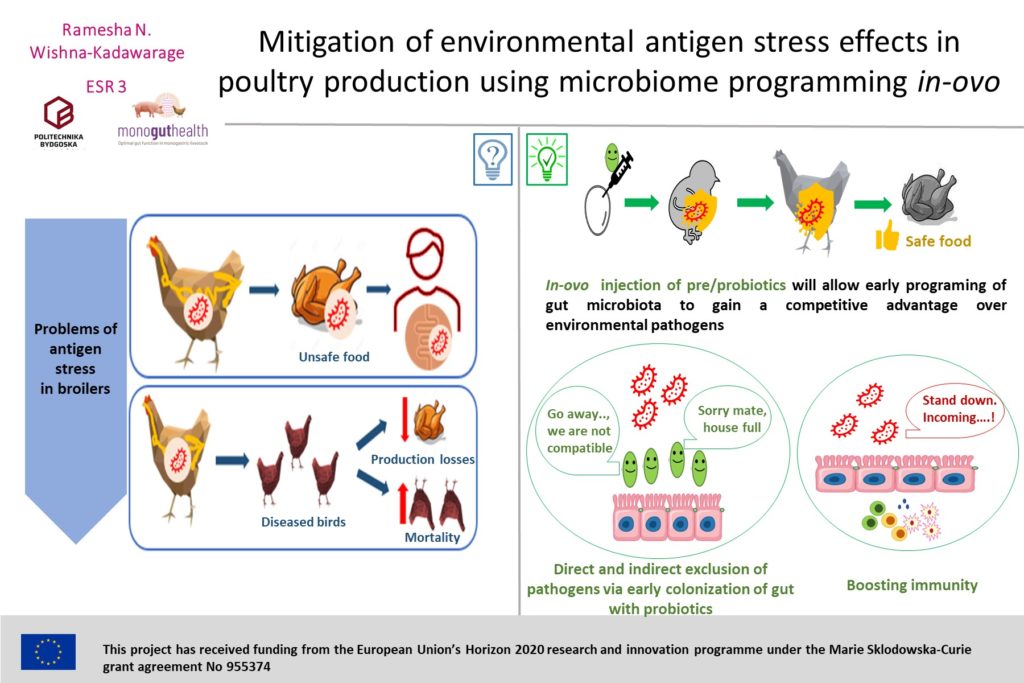ESR3: Mitigate environmental antigen stress effects in poultry production using microbiome programming in ovo
Background
Animal health is affected by dysbacteriosis due to disturbances of ‘normal’ gastrointestinal microbiota by pathogen-induced infections. These issues, together with the increasing awareness of antibiotic resistance problems for humans, further impair consumers’ acceptance of intensive broilerChickens kept for meat production. Fast growing breeds can reach a weight of over 2 kg at 5 weeks of… production and reduce trust in the quality and safety of poultry products. One of the strategies which might be applied to reinstate this trust is microbial programming with bioactive substances (prebioticsSelectively fermented ingredients that allows specific changes in the composition or activity of the…, probioticsLive microbial feed supplements, which beneficially affects the host animal by improving its intesti…) through in ovo stimulation. The pre-hatch period accounts for 1/3 of the life span of broilerChickens kept for meat production. Fast growing breeds can reach a weight of over 2 kg at 5 weeks of… chicken. Thus, the in ovo period represents a substantial time of critical developmental events, which can be influenced in the hatchery.
Objectives
Deliver pre- and/or probioticsLive microbial feed supplements, which beneficially affects the host animal by improving its intesti... with proven anti-environmental antigen activity and prove the concept of perinatalRelating to the time, immediately before and after birth. microbiome programmingA targeted manipulation of the microbiota composition in a biological system. in monogastrics for sustainable, healthy and affordable food production.
As long-term goal, the elaborated tools for perinatalRelating to the time, immediately before and after birth. adaptation should be implementable by industry partners.
Methods
The basic methodology used in this project will be in ovo technology to test the impact of prebioticsSelectively fermented ingredients that allows specific changes in the composition or activity of the... and/or probioticsLive microbial feed supplements, which beneficially affects the host animal by improving its intesti... (Bifidobacteriaceae and Lactobacilliaceae selected based on in vitro efficacy of their anti-Campylobacter, anti-Salmonella properties) on chicks’ GITThe part of the digestive system that consists of the stomach and intestines..
The impact of the selected bioactivesBiologically active compounds, which might have positive impact on biological processes in organisms... on the host organism will be determined undertaking a histopathological assessment of GIT tissues and transcriptomic profiling of major GIT-associated immune tissues.
The final validation of the perinatal stimulation of gut microbiota will be done by a pathogen challenge in vivo assay. The downstream analysis of this experiment will cover: histological studies of gut and muscle tissues, genomic analysis of gut-associated lympho-epithelial tissues including spleen, caecal tonsils and mucosa.
The post in vivo analysis will determine bacteriological status of meat samples and meat quality traits assessment.
Expected results
New pre- and/or probioticsLive microbial feed supplements, which beneficially affects the host animal by improving its intesti... with in vitro confirmed antibiotic properties (anti-Campylo, anti-Salmonella and anti-Eimeria) determined (D2.2).
The impact of in ovo injected pre-and/or probioticsLive microbial feed supplements, which beneficially affects the host animal by improving its intesti... on post hatch development available (D1.7, D2.9).
The strategy for microbiome programmingA targeted manipulation of the microbiota composition in a biological system. by in ovo injection in vivo experiment validated (D3.5).
Planned secondments
- At: TEAGASC (3 mo); to perform an in vitro trial for Objective 1;
- At: Drobex Agro (1 mo); to learn hatch management strategies and additional treatments performed under practical farm conditions;
- At: Vetdiagnostica (1 mo); to receive industry training covering production evaluation scheme from hatchery to farm including practical aspects like veterinary diagnostics and onset on farm for Objective 2;
- At: AU (4 mo); to perform a pathogen challenge trial.
Enrolment in Doctoral degree:
ESR3 will be enrolled at the Department of Animal Biotechnology and Genetics, Faculty of Animal Breeding and Biology of PBS.
Supervisors
Maria Siwek (PBS), Rita Hickey (TEAGASC)
